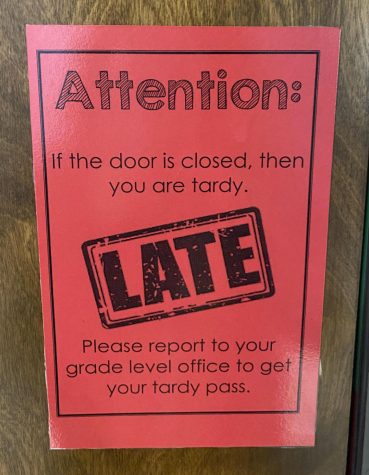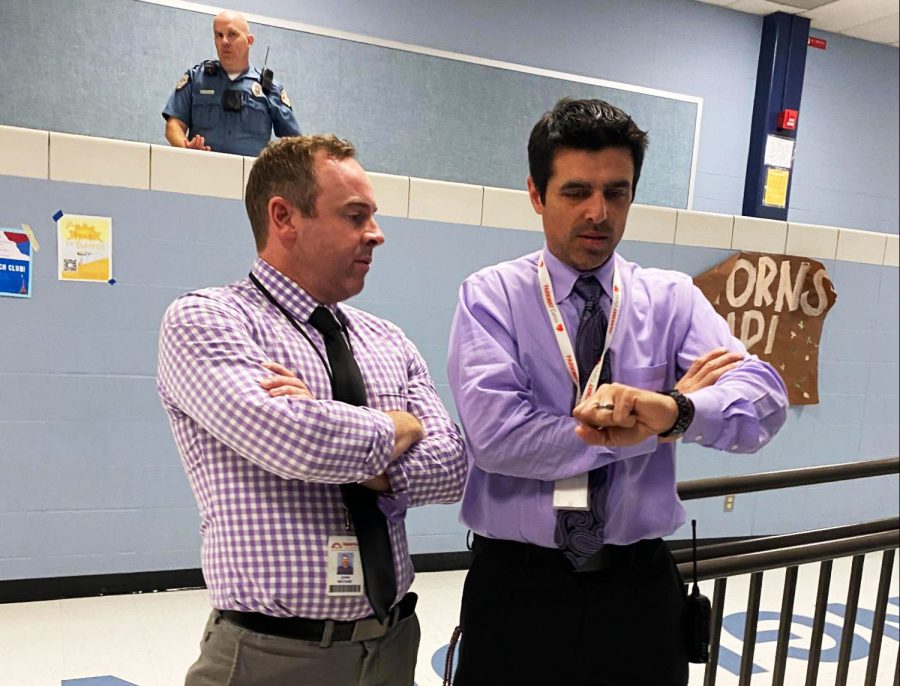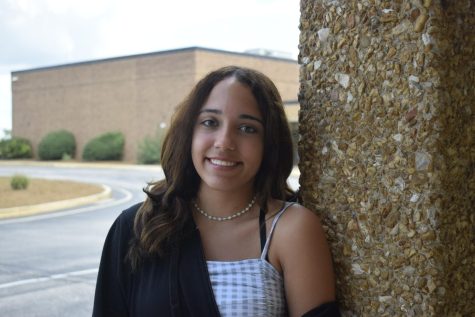After Principal John McCabe took the reins, he craved the spirit of a larger school. He began by prioritizing school safety.
“I don’t want to change a lot of stuff, but certain things are really important to me as the building leader. The number one thing I like to focus on is student and staff safety,” McCabe said.
Six Strikes, You’re Out

McCabe began by enforcing a tardy policy. When students arrive late to class, they must report to their grade level principal for a pass. The grade-level principal tracks the student’s behavior, so they can correct it before it becomes problematic.
Students have six chances to be late to class. After a student has exceeded their limit, they receive a detention.
“I hope [the tardy policy] deters students from avoiding classes. We need [students] in classes where they’re supposed to learn with [their] teacher. That’s going to help [students] be successful in the class,” McCabe said.
Marketing teacher Kelly Kennedy enforces the tardy policy. Last year, the hallway right outside her classroom was crowded while class was in session, causing a distraction for her students.
“I think it’s a great [tardy policy]. It’s already making a difference; it’s not supposed to be a punishment. It is a way of ensuring students are actually in the classroom and not missing educational opportunities,” Kennedy said.
Unlike Kennedy, some students are against the policy.
“Six tardies just doesn’t feel like enough, especially since traffic and other factors make it so easy to be tardy first hour. The fact that they’re making us go down to the office to get a pass makes us miss more of the class, so that defeats the purpose,” sophomore Ben Bloeser said.
Play It Safe

McCabe had the vending machines moved inside the cafeteria, leaving little to no excuse to walk out of the room. Once lunch begins, all doors leading to the lunch room are closed, and administrators, as well as student resource officer Matthew Paubel, ensure students do not go back upstairs.
“[One day] I left my lunch in my car, and they wouldn’t let me go get it. They made me get a pass. I think it’s stupid I couldn’t go get my lunch. [Did] they think I was going to run away?” junior Amelia Upchurch said.
Along with the movement of the vending machines to the cafeteria interior, McCabe has also prohibited students from opening the doors of the building. If people need building access, they are to register at the front door.
“We’re not going out of the building when we shouldn’t be or allowing for any opportunity for a door to be propped or open. That could lead to someone we don’t want in the building coming in,” McCabe said. “I want to give [students] access to everything [they] need, bathrooms, vending machines.”
With 29 school shootings across America this year, sophomore Mya Rangel appreciates McCabe’s concern for student safety.
“These policies are very reasonable. I have a little brother that’s coming to high school and I don’t want him to have to experience a school shooting. I would never want him to go through anything like that,” Rangel said.
Hallway Flashpass

To prevent students from roaming the halls during instructional time, McCabe has also instituted an orange hallway pass required when students leave their classroom. The passes help staff know that the student has permission from their teacher to be outside class.
“It’s really easy for a student to flash me their pass in the hallway, and I have no reason to be suspicious because I know an adult has granted access to be in the hallway. It’s working; we see less unsupervised behaviors in the hallway,” McCabe said. “It’s not to micromanaging, but so that I know that there’s a trusted adult who knows where [students] are,” McCabe said.
Most teachers are appreciative of McCabe’s efforts to increase student classroom engagement.
“Requiring students to have a pass in the hallways encourages them to be in class, [be] more motivated and way more successful,” Spanish teacher Jessica Verywest said.




![Smiling in a sea of Longhorns, Fox 2 reporter Ty Hawkins joins junior Darren Young during the morning Oct. 3 pep rally. The last time West was featured in this segment was 2011. “[I hope people see this and think] if you come to [Parkway] West, you will have the time of your life because there are so many fun activities to do that make it feel like you belong here. I was surprised so many people attended, but it was a lot of fun,” Young said.](https://pwestpathfinder.com/wp-content/uploads/2025/10/Edited2-1200x798.jpg)
![West High seniors and families listen as a representative of The Scholarship Foundation of St. Louis, Teresa Steinkamp, leads a Free Application for Federal Student Aid (FAFSA) workshop. This session, held in the library, provided guidance on financial aid, scholarships and student loan options. “This event is very beneficial for any seniors who are applying to or considering applying to colleges after high school [because] the cost of college is on the rise for seniors and parents,” college and career counselor Chris Lorenz said.](https://pwestpathfinder.com/wp-content/uploads/2025/09/DSC_4478-1200x778.jpg)
![Senior Kamori Berry walks across the field during halftime at the Homecoming football game on Sept. 12. During the pep assembly earlier that day, she was pronounced Homecoming Queen. “I thought it was nice that the crowd [started] cheering right away. I know [my friends] were really excited for me, and my family was happy because typically non-white people don't win,” Berry said.](https://pwestpathfinder.com/wp-content/uploads/2025/09/DSC7046-Enhanced-NR-1200x798.jpg)



![Pitching the ball on Apr. 14, senior Henry Wild and his team play against Belleville East. Wild was named scholar athlete of the year by St. Louis Post-Dispatch after maintaining a high cumulative GPA and staying involved with athletics for all of high school. “It’s an amazing honor. I feel very blessed to have the opportunity to represent my school [and] what [it] stands for,” Wild said.](https://pwestpathfinder.com/wp-content/uploads/2025/05/unnamed-6-1200x714.jpg)
![The Glory of Missouri award recipients stand with their certificates after finding out which virtue they were chosen to represent. When discovering their virtues, some recipients were met with contented confirmation, while others, complete surprise. “I was not at all surprised to get Truth. I discussed that with some of the other people who were getting the awards as well, and that came up as something I might get. Being in journalism, [Fellowship of Christian Athletes and] Speech and Debate, there's a culture of really caring about truth as a principle that I've tried to contribute to as well. I was very glad; [Truth] was a great one to get,” senior Will Gonsior said.](https://pwestpathfinder.com/wp-content/uploads/2025/04/Group-Glory-of-Missouri.jpg)

